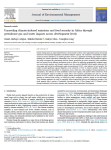Adigun I.A., Bastola S., Choo I., Jung Y. (2025). Unraveling climate-induced emissions and food security in Africa through greenhouse gas and water impacts across development levels. Journal of Environmental Management, 01/10/2025, vol. 393, p. 127161.
https://doi.org/10.1016/j.jenvman.2025.127161
https://doi.org/10.1016/j.jenvman.2025.127161
| Titre : | Unraveling climate-induced emissions and food security in Africa through greenhouse gas and water impacts across development levels (2025) |
| Auteurs : | I.A. Adigun ; S. Bastola ; I. Choo ; Y. Jung |
| Type de document : | Article |
| Dans : | Journal of Environmental Management (vol. 393, October 2025) |
| Article en page(s) : | p. 127161 |
| Langues : | Anglais |
| Langues du résumé : | Anglais |
| Catégories : |
Catégories principales 07 - ENVIRONNEMENT ; 7.5 - Dégradation : Impact, DésertificationThésaurus IAMM CHANGEMENT CLIMATIQUE ; GAZ A EFFET DE SERRE ; AGRICULTURE ; SECURITE ALIMENTAIRE ; EAU DISPONIBLE ; AFRIQUE |
| Résumé : | Climate change poses an unprecedented threat to food security in Africa, where agricultural systems are already strained by environmental degradation and limited adaptive capacity. The continent's vulnerability is heightened by its heavy dependence on rainfed agriculture; however, a significant knowledge gap remains in understanding how climate-agriculture relationships vary across developmental contexts and geographical regions. This study investigated the relationships between climate, greenhouse gas (GHG) emissions, water availability, and food security across different development levels in Africa. By employing geographically weighted regression, meta-frontier analysis, and Granger causality tests, the research identified critical spatial variations, efficiency gaps, and key drivers affecting per-capita crop production (PCCP), a key indicator of food security. The results revealed significant regional disparities in the sensitivity of PCCP to climate variables. North Africa exhibited pronounced vulnerability to temperature stress, while East Africa displayed strong dependence on precipitation. The influence of water availability varied across regions, with positive effects observed in West Africa and negative impacts recorded in Central Africa. GHG emissions, particularly N2O and CH4, are key drivers of PCCP. Contrary to expectations, higher Human Development Index (HDI) levels do not consistently translate to enhanced food security, as evidenced by Mali's exemplary resilience, despite its low-HDI status. These findings emphasize the need for regionally tailored agricultural policies and adaptation strategies. This study supports Africa's pursuit of Sustainable Development Goals 2 (Zero Hunger) and 13 (Climate Action) through sustainable food-security strategies and climate-resilient agricultural development. |
| Cote : | Réservé lecteur CIHEAM |
| URL / DOI : | https://doi.org/10.1016/j.jenvman.2025.127161 |







